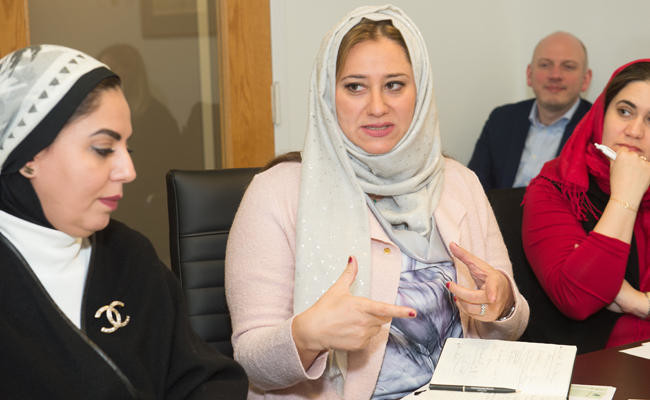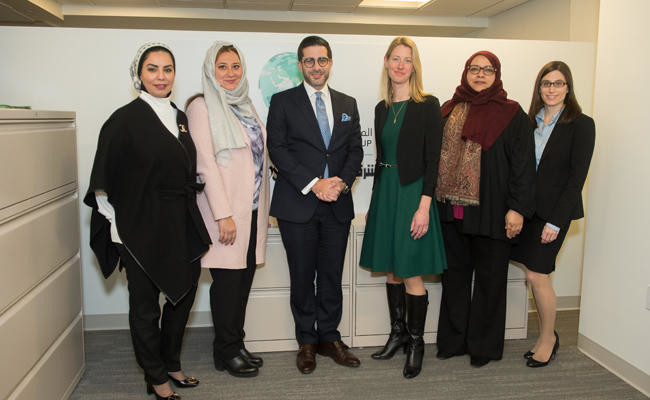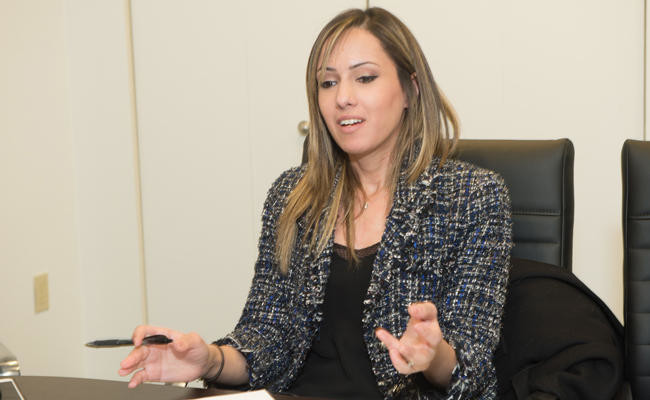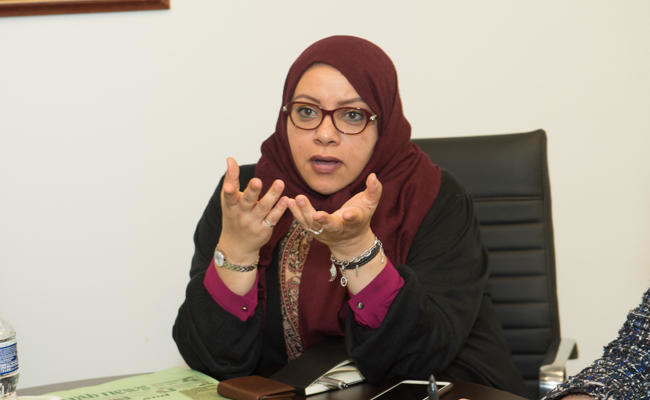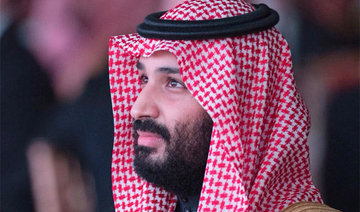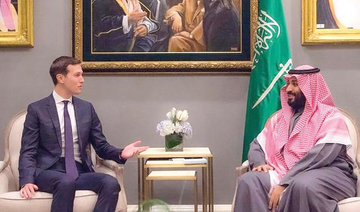WASHINGTON: All Saudis have a personal oil well in their back yard, women from the Kingdom are widely repressed and definitely cannot speak English, and all Americans play beach volleyball.
These are just some of the common stereotypes raised by panelists at an Arab News roundtable discussion held in Washington on Friday, in which women from Saudi Arabia and the US debated public views about their nations and how misperceptions can be addressed.
The discussion, held during the visit by Saudi Crown Prince Mohammed bin Salman to the US, heard about both perceptions of citizens of the two countries and about the societies as a whole.
Kerry Boyd Anderson, a US-based political risk consultant and writer, said that Saudi Arabia still struggled with an image problem in the US — although she said that the visit by the crown prince was important in addressing this.
“Saudi Arabia is still struggling with the post-9/11 perception problem in the United States … Even though those of us who actually follow the Middle East know there has been massive change,” she said.
“It’s going to take a lot of effort if you actually want to change American perceptions.”
Allegations about Saudi Arabia’s human rights record were also raised as impacting American public perceptions, Boyd Anderson said. But the move to allow women to drive from this summer provided an image boost, she added.
“A lot of Americans tend to think of Saudi women as very repressed. And I think that the move to allow women to drive … was very important for a lot of Westerners to see. Because it was always the thing a lot of people would talk about,” she said.
The roundtable discussion was the first event to be held in the recently inaugurated Saudi Research and Marketing Group office in Washington, which will be home to Arab News’ planned bureau in DC. The discussion, titled “Vision 2030 and the Role of Women in Saudi Reforms,” was moderated by Faisal J. Abbas, editor in chief of Arab News.
Somayya Jabarti, the editor in chief of Saudi Gazette, said that the move to allow women to drive was just the start of reforms for women in her country.
“This is the beginning. The decision (to allow) women to drive was for practical reasons mostly. It wasn’t to improve the image of Saudi Arabia or to justify ourselves,” she said.
“I think the next step, which is much more important, concerns the male guardianship system, which I believe is sort of being dismantled, bit by bit. Which I also think is a very intelligent approach, so it doesn’t provoke the challenging forces.”
Under the male guardianship system, Saudi women must receive permission for certain activities, such as traveling abroad.
But Jabarti said that the system had been misinterpreted by the international media, with claims that women cannot, for example, open a bank account or gain access to health care without permission.
“The Western media seems to get it wrong when it comes to what we can do and cannot do in relation to the male guardianship system,” she said.
Other members of the discussion group also pointed to the media’s role in covering Saudi society. Rania A. Razek, a Saudi-American photographer, said the global media has only intermittent interest in Saudi women’s affairs.
“It’s as if it’s a snooze on an alarm clock. Once something happens, a woman does something, it goes on the media for one day, and then it’s snoozed for another two years. And then something else happens, a woman does something else and it’s news, and then the world sees it once and then forgets it,” she said.
Jabarti said that, despite the easing restrictions on women in Saudi Arabia, hers is not the first generation to thrive.
“It isn’t (only) now that women are becoming doctors, academics and scientists. We’re not even part of the pioneering generation of women professionals in Saudi Arabia. We’re part of maybe the third or the fourth … Regardless of all the restrictions that have existed, women have achieved. So I think we need to give credit to the women who have come before us,” she said.
She said that there are other misconceptions and stereotypes about Saudis. “We still get the ‘oil well in your back yard’ (comments) … The stereotype that we’re all rich,” she said. “(Some) people are surprised that I’m Saudi and I speak English.”
Dr. Mody Al-Khalaf, Shoura council member and former diplomat at the Saudi Embassy in US, discussed the council’s involvement in an anti-harrassment law for women.
She also raised the recent CBS interview with the Saudi crown prince, in which he acknowledged that Saudi women “still have not received their full rights. There are rights stipulated in Islam that they still don’t have.”
Al-Khalaf said: “He was very honest about women not having all their rights within Shariah. That was the first time, for me, to hear an authoritative figure say, ‘Yes, women in Saudi Arabia still do not have all their God-given rights’.”
Lina Al-Maeena, Shoura council member and women’s sports enthusiast, explained how the Shoura is a consultative council for the king, giving recommendations and assessing and amending existing laws.
But she dismissed the “stereotype” that female members of the Shoura only involve themselves in issues connected to women’s affairs. “We should be the voices of everybody in the Kingdom,” she said.
But stereotypes work both ways, she added — such as the notion that all Americans enjoy beach volleyball.
“A lot of people don’t realize that a lot of American families are very conservative, they are very religious,” said Al-Maeena.
Conversely, not everyone in Saudi Arabia is as conservative as some might think, another member of the discussion group said.
The US-based Dr. Ellen Wald, energy consultant and author of the book “Saudi, Inc.,” pointed out that women already drive cars in Saudi residential compounds attached to the energy company Aramco.
“Most people I’ve spoken to have no idea that women at Aramco do drive in the Aramco area (and) don’t wear abayas,” Wald said. “There’s a lot of things that people don’t know.”
Faisal J. Abbas, editor in chief of Arab News, said that there was too much attention paid to what women wear regardless of whether they are from Saudi Arabia or San Francisco.
“In all societies there is an obsession with what women wear, be it too little or too much. Let’s stop judging women on what they wear, and let’s start judging them on what they do,” he said.
The roundtable discussion also put forward some recommendations for how to improve perceptions.
Wald said that she had found it difficult to get a visa to Saudi Arabia despite spending years researching a book on the country.
Easing such restrictions, as well as providing more efficient embassy services and information, would all help improve public perceptions, Wald added.
“I called the Saudi Embassy so many times to try to talk to them about a visa, and no one would up the phone,” she said. “There’s no information for Westerners about going … There are no guidebooks about Saudi Arabia.”
Ola Salem, head of communications at the Washington-based Arabia Foundation, said that access to Saudi Arabia for the media was also important.
“Journalists have access to Dubai and the UAE so much easier than Saudi Arabia. That’s why you don’t see (many) pictures of women from Saudi Arabia, because (the media) can’t get it,” she said.
Saudi, US women discuss stereotypes, common challenges at Arab News DC roundtable
Saudi, US women discuss stereotypes, common challenges at Arab News DC roundtable

Saudi crown prince discusses regional military escalation with Turkish president, Sudan’s army chief
Saudi crown prince discusses regional military escalation with Turkish president, Sudan’s army chief

- Erdogan affirms support for all measures taken by the Kingdom to protect its security
- Chairman of Sudan’s Transitional Sovereignty Council Gen. Al-Burhan expresses solidarity with Kingdom
RIYADH: Saudi Crown Prince Mohammed bin Salman discussed the military escalation in the region and its implications for regional and international security with Turkish President Recep Tayyip Erdogan on Sunday, Saudi Press Agency reported.
During a phone call with the crown prince, Erdogan expressed his country’s condemnation of Iranian aggression targeting the Kingdom, and its rejection of anything that infringes upon the Kingdom’s sovereignty and stability.
He also affirmed his support for all measures taken by the Kingdom to protect its security and citizens.
Prince Mohammed also received a phone call from the Chairman of Sudan’s Transitional Sovereignty Council Gen. Abdel Fattah Al-Burhan.
During the call, the two officials discussed the military escalation in the region and Al-Burhan condemned the blatant Iranian aggression against the Kingdom’s territory. He also expressed Sudan’s solidarity and support for the Kingdom.


